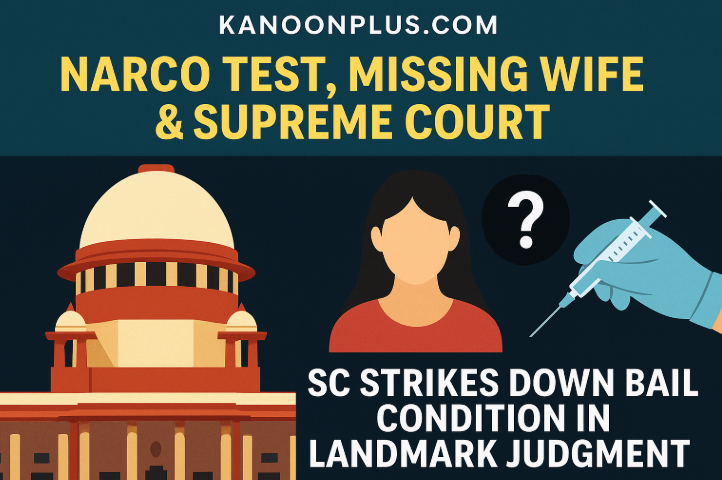🎮 Introduction: A Missing Wife and a Dangerous Proposal
It all began in a small village near Mahua, Bihar, where a young woman, married to Amlesh Kumar, mysteriously vanished.
Her sudden disappearance triggered suspicion, fear, and eventually a major legal battle that would reach the Supreme Court.
This wasn’t just about one family — it reignited a national debate on the controversial scientific method: narco-analysis.
🧹 The Incident: A Bus Stop, A Vanishing Act
On August 21, 2022, Amlesh Kumar claimed that while they were en route to Ayodhya, his wife stepped off the bus at Baabali Chowk, Mahua — and never returned.
A few days later, her sister filed an FIR alleging dowry torture, beating, and suspected murder by Amlesh and his family.
Although a co-accused allegedly confessed she was thrown into the Saryu River, there was no body recovered, no forensic trace, and no confirmed identification.
That confession — made to police — is not admissible in court unless it leads to independent evidence under Section 27 of the Indian Evidence Act.
To this day, her fate remains unknown, and the case hangs over the village with unanswered questions.
⚖️ The Bail Hearing Twist: Narco Test Ordered
Amlesh Kumar had been in judicial custody since his bail was rejected in August 2023. Despite claims and confessions, no hard evidence emerged for over a year.
In November 2023, Amlesh applied for bail. During the hearing, the lady SDPO (Mahua) proposed:
“I will conduct narco-analysis tests on all accused and witnesses, if required.”
The Patna High Court accepted it without scrutiny, recorded no consent, and adjourned the case to July 2024.
🚨 Supreme Court Steps In: Is Narco Test a Right?
Amlesh Kumar challenged this in the Supreme Court, stating:
“Even if I’m willing to take the test, it cannot be forced as a condition for bail. That’s illegal.”
The SC appointed Senior Advocate Gaurav Agrawal as amicus curiae to assist, realizing the broader legal and constitutional implications.
🧾 What the Amicus Curiae Said
- Narco-analysis must never be forced. Even voluntary consent requires judicial oversight and NHRC compliance.
- It is not an absolute right. The court must apply discretion based on context and stage of trial.
- Test results are not direct evidence. Only discoveries made after the test are admissible under Section 27.
- Consent may be influenced by fear or false hope — especially among vulnerable groups.
- It has no place in bail hearings. Bail must be based on law, not experimental science.
🧠 Three Big Questions Before the Court
- Can courts accept police proposals for narco during bail hearings?
- Can a voluntary narco-analysis alone justify conviction?
- Does the accused have a legal right to demand the test?
🔍 Why Q2 Became Crucial
During hearings, the Court explored if even voluntary narco — where the accused agrees — could be used as the sole basis for conviction.
Based on the Selvi v. State of Karnataka (2010) precedent:
- Statements made under narco cannot be used as direct evidence.
- Only facts discovered as a result of the test may be admitted under Section 27.
The Court made it clear: Voluntary narco is not a shortcut to justice.
📜 The Verdict: Rights Over Experiments
On June 9, 2025, the Supreme Court of India ruled:
- Narco tests cannot be ordered during bail hearings.
- Even voluntary narco is not a legal right; courts have full discretion.
- Such tests cannot form the sole basis for conviction.
- Only evidence discovered afterward and corroborated is admissible.
The SC also did not grant bail to Amlesh Kumar — it only struck down the High Court’s earlier order and asked it to reconsider the bail plea afresh.
🥊 Why This Case Matters
This case is about limits of investigation in a democracy.
The Court warned:
“Science must never override the Constitution — especially Articles 20(3) and 21.”
Narco is a tool — not a substitute for justice.
🎤 Final Thought: A Message from Mahua to the Nation
From a small town in Bihar to the highest court, this case reminds us:
The Constitution protects not just the innocent — but the very process that ensures justice.
